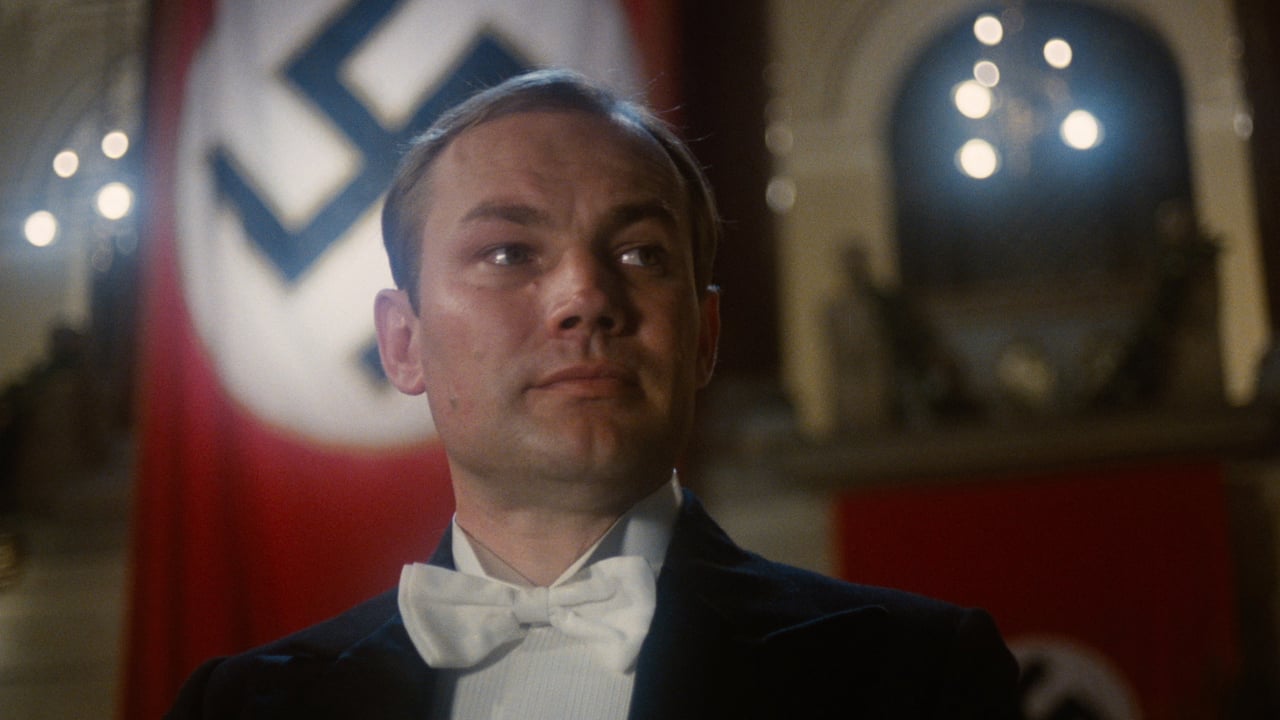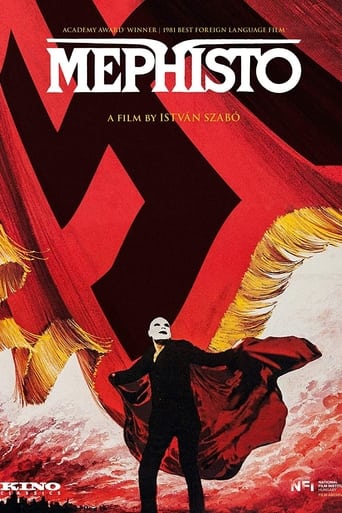

Mephisto is disquieting, ironic movie. Its star is Klaus Brandauer, who plays Henrik Hoefgen, a German actor slumming it in Hamburg in the 1930s, and dreaming of stardom just as the Nazis come to power. His moral challenge is obvious: to resist the Nazis, or work within the system? Brandauer is fabulous through the movie's twists and turns, and though occasionally clumsy, manages to convey Hendrik's timidity, self-deception, pride and guilt as he moves through a violent and chaotic world.The movie is based on Klaus Mann's novel of the same title. Mann was part of a literary dynasty. His father was Thomas Mann, the famous Nobel-prizewinning writer of "Buddenbrooks," "The Magic Mountain," and "Death in Venice." His uncle was Heinrich Mann, a no less famous writer in his day, known to film-goers as the writer of "Professor Unrat," which became the great Marlene Dietrich film "Der Blaue Engel."The movie, in a way, plays out the debate that the two elder Mann brothers had about art and politics. Thomas always felt aloof from politics, ensconced in the purer regions of art and culture. During WWI, he published a book called "Reflections of an Unpolitical Man," whose title says it all. Heinrich was a satirist, who believed that art must contribute to the betterment of society, and that it could not avoid being political. Their debate continued into the Nazi era, though to say how their minds changed would spoil this film."Mephisto" is occasionally a little obvious or simplistic, and some of the minor characters are unconvincing, but Brandauer shines in the main role, and the music, set design and camera-work are superb. A scene early in the movie, when the Hitler Youth meet in the street, looks and sounds like a sick parody of Riefenstahl.This will always be a timely film, and certainly earned its Oscar.
... View MoreIt's pre-War Germany. Theater actor Hendrik Hoefgen (Klaus Maria Brandauer) becomes successful playing Faust. The Nazis take a liking to him and the play. Hoefgen starts abandoning his principles to ingratiate himself with the powerful Nazis. He essentially sells his soul to achieve his dreams which is the same as the character Faust.Klaus Maria Brandauer is a great actor and he always commands the screen. The story is poetic and presents a compelling idea. The static camera style left me a bit cold. At a certain point, I stop caring about Hoefgen. I don't necessarily care about any of the other characters either. I like the concept a lot more than the actual movie.
... View MoreWhat can one say about this film apart from it being totally brilliant? Klaus Maria Brandauer is ideally cast in the role of Hendrik Hoefgen. The character of Hoefgen is a thinly disguised version of the famous German actor and Director of the Prussian State Theatre in Berlin, Gustav Grundgens. Grundgens compromised with the National Socialist authorities under Hitler to retain his role in the theatre. Others left as they did not want to be associated with the Third Reich and all its horrors. Marlene Dietrich was one such person. Grundgens remained. This film is a classic for any drama student as it shows the state of theatre in Germany before the rise of the Third Reich in Germany. It very clearly depicts theatre pre-1918 and also the early and important work of Bertolt Brecht. The thuggery of the Nazi German regime is clearly exposed with all the filth who polluted the upper echelons of society down to the working man. This is a brilliant piece of film making. Don't miss it as it is gripping drama.
... View MoreAnother disturbing film about the complicity of ordinary people in fascism, which explores similar territory to "Cabaret", "The Conformist", "The Leopard" and "The Remains of the Day". It argues that fascism demonstrates how difficult it is to separate one's public and private roles and beliefs from politics. The title character, an actor, starts to realise how his "make believe" public role has very real, tragic consequences. In this sense, the film has merit beyond its superb acting and other technical features: it subverts the liberal pieties of Hollywood drama which resolve all conflict within the confines of the existing social system. It undercuts the banality of much film criticism which says it is "just entertainment" with "no subtext"- as if produced in a social/historical vacuum with no point of view. In short, the film argues that artists, like everyone else, have to take some responsibility and assume a critical role or risk being haunted, like Mephisto, by the awareness that they have become pawns in a dangerous game.
... View More